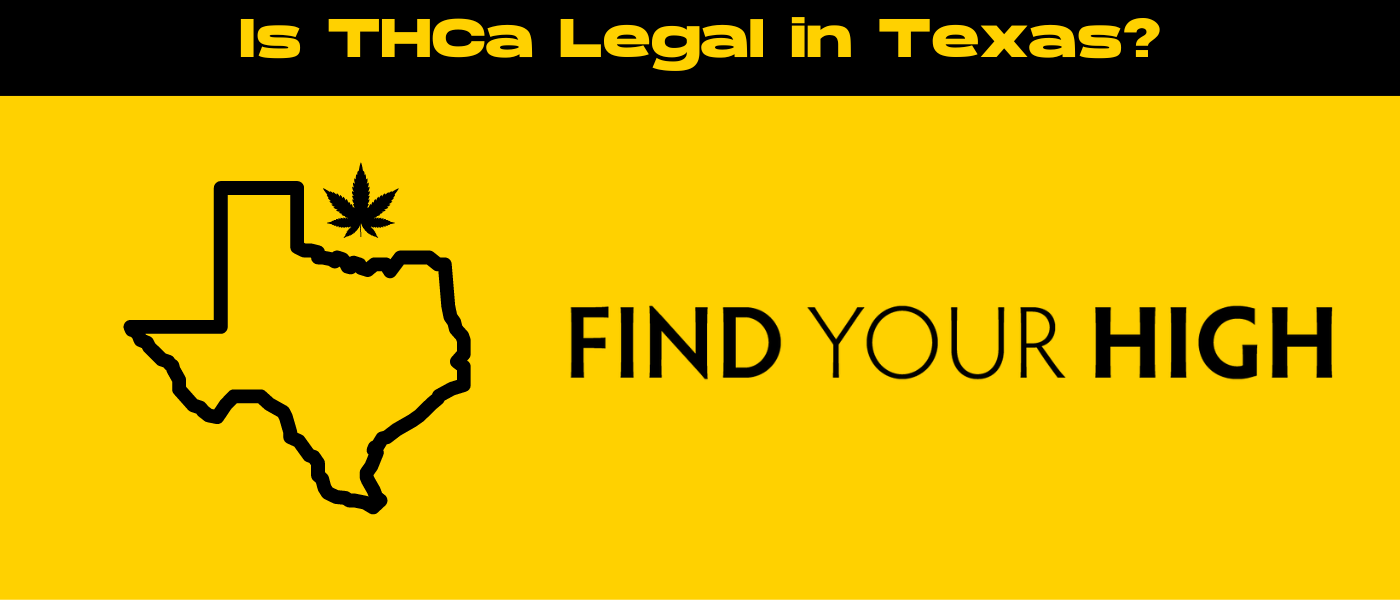Across the state, Texans are being introduced to THCa, which begs the question: Is THCa legal in Texas?
As the debate surrounding THCa hemp flower continues to evolve, the United States finds itself in a complex web of legality that varies drastically from state to state. One lesser-known compound of the cannabis plant, THCa, or tetrahydrocannabinolic acid, is at the center of this debate conversation.
Unlike THC, which is the psychoactive component known for “getting high,” THCa flower is a non-intoxicating precursor that converts to THC when exposed to heat.
Within the borders of the Lone Star State, the legal status of THCa has sparked curiosity and confusion alike. This blog post aims to dive into the legal intricacies of THCa in Texas, shedding light on the substance’s standing amidst the state’s evolving cannabis laws.
Brief History of Cannabis Laws in Texas
Cannabis prohibition in Texas can be traced back to the early 20th century, reflecting the overall sentiment and the wave of marijuana regulations across the US.
For a long time, strict laws classified cannabis as an illicit substance, making its use, possession, and distribution heavily restricted. But things are changing slowly.
In recent years, Texas has been seeing some interesting trends in cannabis legislation. They now recognize the difference between high-THC marijuana and low-THC hemp, which was legalized after the Farm Bill of 2018.
While full-scale legalization is still pending, Texas has a limited Compassionate Use Program that allows the use of low-THC cannabis for treating certain medical conditions.
It seems like the state is starting to loosen up its historically conservative stance on cannabis, but ultimately, only time will tell.
Understanding THCa
THCa, also known as tetrahydrocannabinolic acid, is different from its famous cousin THC (tetrahydrocannabinol) in terms of its chemical structure and effects.
When in its raw form, THCa is a non-psychoactive compound found in fresh cannabis plants. Its molecular structure holds an additional carboxyl group that prevents it from fitting into the body’s CB1 receptors, which are responsible for the psychoactive effects associated with THC.
It is only through decarboxylation, a process initiated by heat, that THCa loses that carboxyl group and transforms into the intoxicating THC. This characteristic means that unless heated, as through smoking or vaporizing, cannabis in its raw form won’t produce the ‘high’ effect.
Regarding its medical benefits, research into THCa is still in its early stages, but studies suggest potential therapeutic properties, including anti-inflammatory and neuroprotective effects. Wellness enthusiasts and some patients with chronic conditions are increasingly interested in these benefits, especially in forms that won’t impair cognitive function.
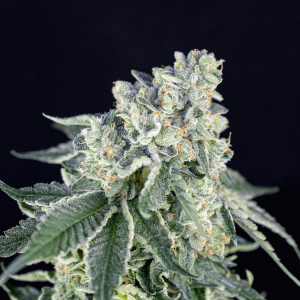
Federal vs. State Laws on Cannabinoids
The legal landscape for cannabinoids can be quite a maze of federal law and state regulations, sometimes resulting in a confusing mix of laws.
The 2018 Farm Bill represented a seismic shift in hemp policy by effectively removing hemp, defined as cannabis plants containing less than 0.3% THC, from the Schedule I controlled substance list under the Controlled Substances Act. This reclassification opened the door for the legal cultivation, production, and sale of hemp and its derivatives, placing cannabinoids like CBD and THCa into the spotlight.
However, the Controlled Substances Act still classifies THC as a Schedule I drug, which makes interpreting the legal status of THCa a bit confusing. Since THCa can convert into THC through decarboxylation, there’s an ongoing debate within both legal and scientific communities regarding how it should be classified and regulated.
Current Legal Status of THCa in Texas
In Texas, as in several states, the state laws have begun to deviate from the federal perspective. While Texas laws have acknowledged the legality of hemp-derived cannabinoids under the Farm Bill, its stance on THCa specifically is a gray area.
However, since THCa isn’t psychoactive in its natural state, it doesn’t fall under the same state criminal statutes as THC.
Is THCa Legal in Texas? – The Legal Gray Area of THCa
Figuring out the legal status of THCa flower and other hemp products under Texas law is a real challenge for state law enforcement and lawmakers when it comes to regulating cannabis compounds.
Since THCa isn’t psychoactive in its natural form, it creates a legal loophole under federal regulations. That means products with THCa can be sold legally because they’re not psychoactive when you buy them. It’s similar to how things started with CBD, another non-intoxicating cannabinoid known for its therapeutic potential.
In Texas, CBD is completely legal as long as it has less than 0.3% THC. So, this could set a precedent for a more relaxed approach to non-psychoactive cannabinoids like THCa, as long as they follow the current state guidelines on hemp.
But here’s the twist: THCa can convert into THC, which makes its legal status more complicated and confusing.
Industrial Hemp and THCa Regulation Under The Texas Hemp Program
The Texas Hemp Program, established following the 2018 Farm Bill, introduced federal regulations for industrial hemp, but its implications for THCa remain complex.
Under the program, hemp and hemp-derived products are legal if they contain less than 0.3% THC by dry weight. While this regulatory threshold applies directly to THC, the scenario for THCa is less explicit because it is not psychoactive until decarboxylated into THC.
Consequently, the hemp program indirectly influences the legal handling of THCa; hemp-derived products containing THCa may be deemed legal provided they do not exceed the THC limit post-decarboxylation. It’s up to producers and consumers to make sure their products meet these parameters, which ultimately affects how much THCa can be available and used in Texas.

THCa and Medical Marijuana Laws in Texas
Texas’s Compassionate Use Program is taking a cautious step towards allowing medical marijuana in its legal framework.
Although it’s still limited, the program lets patients with certain qualifying conditions, like epilepsy, multiple sclerosis, and terminal cancer, use low-THC cannabis products. This includes oils, inhalers, and other consumables.
THCa, which is non-intoxicating, has found its place in the world of medical use. As long as the final product meets the low-THC requirements, THCa can be a regulated substance. This could bridge the gap between strict views on cannabinoids and the needs of patients seeking alternative treatments.
Consumer Safety and Lab Testing
With the legal landscape for cannabinoids like THCa constantly changing, it’s crucial to prioritize lab testing and reliable product labeling. After all, consumer safety is a top concern!
Rigorous lab tests are not only paramount for ensuring product compliance with state requirements, but they also provide crucial information about the concentration of THCa and its potential to convert into THC, along with the presence of any contaminants, such as pesticides or heavy metals.
State laws generally mandate comprehensive testing and accurate labeling for cannabinoid products. These measures are designed to protect consumers by ensuring the quality of the products they use and to provide transparency about the contents. For instance, tests might measure the exact levels of THCa and confirm that THC concentrations don’t exceed legal thresholds post-decarboxylation.
For consumers, making sure THCa products are legal and safe involves a few steps. First, look for a Certificate of Analysis (COA) from a trusted lab. It confirms the product’s cannabinoid profile and compliance with state regulations. Also, check your state’s rules on THCa and related cannabinoids before buying to stay within the law.
Additionally, consumers should only purchase products from reputable sources where legal compliance is a clearly stated priority. If a product’s labeling is ambiguous or if a manufacturer is hesitant to provide a COA, it should be considered a red flag.
By taking these steps and remaining informed, consumers can navigate the cannabinoid market with a greater sense of confidence and safety.
What to Expect: The Future of THCa in Texas
Looking ahead, the world of THCa regulation in Texas stands at a crossroads of changing laws, legal cases, and expert insights. Stakeholders are keeping a close eye on trends and upcoming bills that may reshape the legal status of THCa.
- Upcoming Legislation to Watch: The Texas legislature may introduce new bills clarifying THCa’s place within the state’s legal framework. These could either tighten restrictions or offer clearer guidelines for the sale and use of THCa products.
- Trends in Legal Decisions: Judicial rulings will play a critical role in the interpretation of existing laws. Any court decisions on cannabis-related cases could set important precedents, impacting how THCa is treated legally.
- Expert Predictions:
- Increased regulatory clarity as part of broader cannabis reform.
- Possible inclusion of THCa in medical research due to its non-psychoactive properties.
- Potential shifts in public opinion influencing legislative changes.
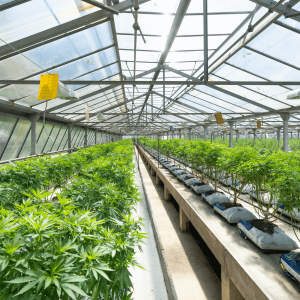
Where to Find THCa in Texas
If you’re seeking to explore the benefits of THCa in Texas, Hyperwolf’s online hemp delivery service offers a convenient solution.
With a range of hemp-derived products, their online platform provides easy access to items rich in THCa, all within compliance with Texas’s legal guidelines. Hyperwolf takes the guesswork out of your purchase by providing detailed product descriptions and the all-important Certificates of Analysis (COA) to ensure you’re receiving high-quality, legal hemp products.
Whether you’re in Dallas, Austin, or anywhere in between, you can rely on Hyperwolf’s commitment to consumer safety and state regulation adherence, delivering right to your doorstep with discretion and ease.
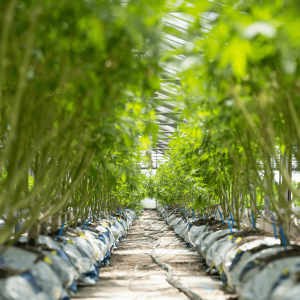
Conclusion
In conclusion, Texas’s approach to THCa regulation shows how things are changing based on the Texas Hemp Program and the Compassionate Use Program.
We’ve seen that THCa has a unique position in the state’s legal framework, and its legality depends on the THC content after decarboxylation. So, is THCa legal in Texas? Yes, but only because upon the point of transaction, it is non-psychoactive in its raw form.
Looking ahead, the laws on cannabinoids in Texas will likely evolve with scientific research, public opinion, and how the legislature responds to a new understanding of the potential benefits of THCa.
In the future, there could be more clarity for consumers and suppliers as state lawmakers deal with the complex relationship between regulation, safety, and the expanding possibilities of cannabis products.
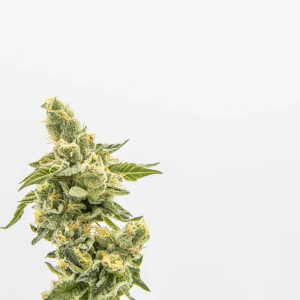
Frequently Asked Questions
What is THCa and why is it legal?
THCa, or tetrahydrocannabinolic acid, is a non-psychoactive cannabinoid found in raw and live cannabis. As the precursor to THC, it converts into psychoactive THC when heated, a process known as decarboxylation. THCa itself is legal in Texas because it does not cause intoxication in its natural state and falls under the Texas Hemp Program’s legal definition for hemp, provided it doesn’t convert into THC above the 0.3% threshold post-decarboxylation.
Do drug tests look for THCa?
Most drug tests are designed to detect THC, not THCa. Since THCa is non-intoxicating and doesn’t have the same psychoactive effects as THC, it’s not typically the focus of standard drug screening. However, prolonged and comprehensive testing may identify the presence of THCa.
Can THCa cause a high?
No, THCa on its own does not cause a high. THCa must be converted into THC through the process of decarboxylation, which occurs at high temperatures, usually when cannabis is smoked, vaporized, or cooked. Only then does it become psychoactive.
Is Delta 9 and THCa the same thing?
No, Delta 9-THC (Δ9-tetrahydrocannabinol) and THCa are different compounds. While Delta 9 is a psychoactive compound that produces the classic ‘high’ associated with cannabis, THCa is a non-psychoactive precursor found in the raw cannabis plant. THCa converts into Delta 9 through decarboxylation when heated.
Is THCa legal in Texas?
Yes, THCa is legal in Texas under state and federal cannabis law as long as it complies with the state’s Hemp Program, meaning that it must not contain more than 0.3% THC post-decarboxylation. Hemp products that meet these standards are permissible under state law.

 Rewards
Rewards




